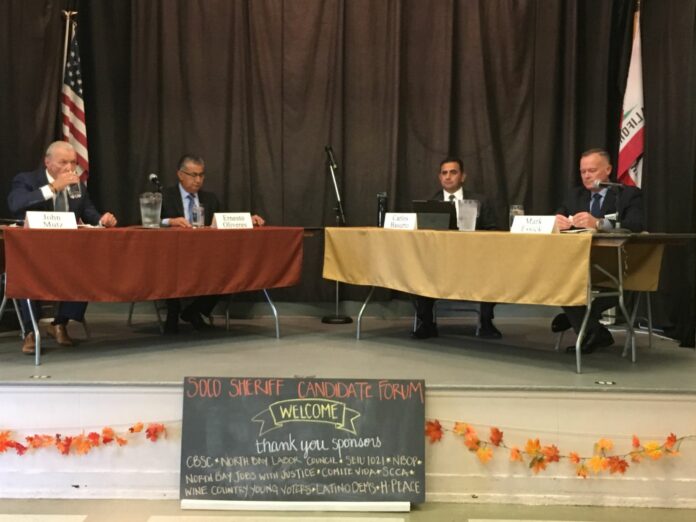
John Mutz, Ernesto Olivares, Carlos Basurto and Mark Essick sat through their first candidate forum in the race to become Sonoma County’s next sheriff. Amie Windsor.
Crowd of 200 show up for first candidate forum
At the sheriff candidate forum held Thursday night at the Santa Rosa Veterans Memorial Building, the word of the night was “engagement.”
The four men running to replace Sheriff Rob Giordano, who was appointed sheriff after Steve Freitas stepped down for health reasons, spent two hours in front of a crowd of nearly 200 people answering questions from moderators former Assemblymember Michael Allen and community activist Mary Watts. The questions posed to the candidates spanned a variety of topics, ranging from immigration, cannabis and military weapons to homeless sweeps and mental illness. Throughout the series of answers, each candidate canonized how the current sheriff’s office lacks adequate engagement with the community, the Independent Office of Law Enforcement Review and Outreach (IOLERO), its own culture within the sheriff’s office and more.
Without saying it outright, each candidate — former Los Angeles Police Department captain John Mutz, Santa Rosa city councilmember and former police officer Ernesto Olivares, Windsor Police Chief Carlos Basurto and Sonoma County Sheriff Captain Mark Essick — indicated the sheriff’s office requires a sea change from the status quo, established by Freitas and his known lack of engagement with the community.
Below are snippets and analyses of the questions asked by the forum’s 10 organizers and public.
On immigration
Both Olivares and Essick stated the sheriff’s office could only build trust with the county’s immigrant community by engaging with the public, allowing them the opportunity to become involved in policy making.
“I want our immigration policy,” Olivares said. “That cannot be created within the confines of the sheriff’s office.”
Essick agreed, saying that improved relations come from hiring to reflect the community, listening and holding town hall meetings.
Mutz didn’t get into specifics about his immigration policies, but assured the Latino community that he “would not do anything that would jeopardize the safety and security of our community.”
Basurto said immigration is a personal matter to him and hammered in that the Latino population would be safe with a Latino sheriff.
On cannabis
Each candidate voiced concerns over maintaining safety in the communities where cannabis is cultivated.
Basurto and Essick both pointed out the looming dangers tied to an industry that still has a deep black market.
“I want to point out safety,” Essick said. “The danger is still there. In the last 18 months, six out of 10 homicides in the county have been related to marijuana.”
Essick recommended working with growers and cultivators to create policy that “makes everyone feel safe.”
Olivares agreed, adding that cannabis is a new industry and that the sheriff is obligated to understand it in its new form.
“Our obligation is to enforce the state law, not the federal law,” Olivares said.
Mutz added that the sheriff’s work in regards to cannabis policy is “one of advocacy.”
“The sheriff has a very important role in influencing policy,” he said.
On culture
Each candidate stated that the culture of the sheriff’s office is a direct reflection of the sheriff. They all voiced beliefs that the sheriff is responsible for changing the culture from the top down. A major step for changing the culture, each said, is changing the hiring practices. While Essick and Olivares said they believe relying on the county’s human resource department can help bring in more diverse applicants to the sheriff’s office, Basurto said the sheriff’s office is the expert.
“We need to be the experts if we want to make the sheriff’s office look like the community it serves,” Basurto said. “It takes engagement. There’s that word again. We are the ones who need to go out there.”
Mutz said the sheriff must serve as a leader to make the sheriff’s office better reflect the county, adding that “there needs to be a career ladder for women” within the office.
On IOLERO
Each candidate indicated the sheriff’s office needed to work more with IOLERO, the office formed in 2015 to conduct independent audits and review of the sheriff’s office after the shooting of Andy Lopez.
“The first quality [to a relationship with IOLERO] is transparency,” Mutz said. “And honesty and accessibility. As the new sheriff I would open the entire office up to IOLERO.”
Essick, who has worked closely on the aftermath of the Lopez case with IOLERO director Jerry Threet, said it is important for the sheriff’s office to work closely with the independent office.
“There’s a tremendous potential and possibility to learn,” Essick said. “We need to have regular dialogue and use them for outreach to the community.”
Basurto also said that constant dialogue would be vital to having the best and most meaningful relationship with IOLERO.
“It’s very important not to alienate ourselves,” Basurto said.
Olivares mirrored his opponents, adding that IOLERO has a “vital role of being in the community.”







